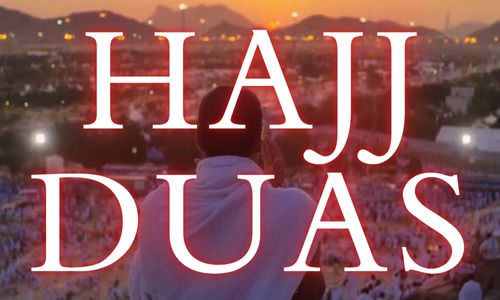
Hajj Duas
Embarking on Hajj, the sacred pilgrimage to Makkah, is a spiritual journey unlike any other. To prepare the heart and mind for this noble obligation, memorizing essential Duas (supplications) is a powerful tool to connect deeply with Allah ﷻ. Below is a comprehensive guide to the key Duas every pilgrim should memorize and recite during the various rites of Hajj. These are not just phrases — they are windows into divine mercy, forgiveness, and immense spiritual elevation.
Duas to Begin the Journey of Hajj
1. Dua for Intention (Niyyah)
Before stepping into Ihram, make a clear and sincere intention:
“Labbayka Allahumma Hajjan”
“Here I am, O Allah, performing Hajj.”
Importance: This intention sets the tone for your entire pilgrimage and is a spiritual declaration of obedience.
Dua When Wearing the Ihram
2. Talbiyah – The Anthem of Hajj
“Labbayka Allahumma Labbayk. Labbayka laa shareeka laka Labbayk. Innal hamda wan-ni’mata laka wal-mulk, laa shareeka lak.”
“Here I am at Your service, O Allah, here I am. There is no partner to You. Truly, the praise and the favor is Yours, and the dominion. You have no partner.”
Memorization Tip: Repeat this often once in Ihram until reaching the boundaries of Makkah. Let this echo from your heart throughout your journey.
Dua When Entering Makkah
3. Dua Upon Seeing the Kaaba
“Allahu Akbar, Allahu Akbar. Laa ilaaha illallaah.”
“Allah is the Greatest. There is no deity worthy of worship but Allah.”
Optional Extended Dua:
“Allahumma zid haadhal-bayta tashreefan wa ta’zeeman wa mahaabatan wa birran.”
“O Allah, increase this House in honor, esteem, reverence, and righteousness.”
Duas During Tawaf (Circumambulation of the Kaaba)
During the seven rounds of Tawaf, recite Duas that are sincere, from the heart, and filled with submission. There is no single prescribed Dua, but the following are widely memorized:
4. Dua Between Rukn al-Yamani and Hajar al-Aswad
“Rabbanaa aatinaa fid-dunyaa hasanah wa fil-akhirati hasanah wa qinaa ‘adhaaban-naar.”
“Our Lord, grant us the best in this life and the best in the Hereafter, and protect us from the torment of the Fire.” (Surah Al-Baqarah: 201)
This is one of the most powerful and comprehensive Duas to repeat.
Duas at Maqam Ibrahim
After completing Tawaf:
“Wattakhidhoo min Maqaami Ibraheema musalla.”
“And take the station of Abraham as a place of prayer.” (Surah Al-Baqarah: 125)
Then pray two Rak’ahs and thank Allah for allowing you to witness His House.
Dua Before Drinking Zamzam Water
“Allahumma inni as’aluka ‘ilman naafi’an, wa rizqan waasi’an, wa shifaa’an min kulli daa’.”
“O Allah, I ask You for beneficial knowledge, vast provision, and a cure from every disease.”
Drink with deep intention, knowing Zamzam is a blessed gift.
Duas During Sa’i Between Safa and Marwah
5. On Safa and Marwah
Begin by reciting:
“Inna as-Safa wal-Marwata min sha’a’irillah…”
(Indeed, Safa and Marwah are among the symbols of Allah…) (Surah Al-Baqarah: 158)
Then say:
“Allahu Akbar, Allahu Akbar, Allahu Akbar. Laa ilaaha illallaahu wahdahu laa shareeka lahu, lahul-mulku wa lahul-hamdu wa huwa ‘ala kulli shay’in qadeer…”
Repeat supplications that come from your heart as you walk. Dua during Sa’i is immensely rewarded.
Duas in Mina
During the days in Mina, focus on:
“Rabbighfir warham wa anta khayrur-raahimeen.”
“My Lord, forgive and have mercy, and You are the best of the merciful.”
This period is ideal for deep reflection and earnest Dua.
Duas at Arafah – The Pinnacle of Hajj
6. The Best Dua on the Day of Arafah
“Laa ilaaha illallaahu wahdahu laa shareeka lahu, lahul-mulku wa lahul-hamdu wa huwa ‘ala kulli shay’in qadeer.”
Prophet Muhammad ﷺ said this is the best supplication to say on the Day of Arafah. This day is your moment to weep, reflect, and plead for forgiveness.
Use your own words as well. Make your tongue flow with humility, desperation, and love for Allah.
Dua at Muzdalifah
Collect pebbles, pray Maghrib and Isha, and then say:
“Allahumma inni as’aluka birahmatika al-latee wasi’at kulli shay’in an taghfira lee.”
“O Allah, I ask You by Your mercy that encompasses all things, that You forgive me.”
Stay under the stars, reflect, and continue your Dhikr and heartfelt Duas.
Dua During Rami al-Jamarat (Stoning the Devil)
For each stone thrown, say:
“Allahu Akbar” – with full conviction, rejecting Shaytan and affirming Allah’s greatness.
After stoning, raise your hands and make Duas sincerely. Ask for strength, protection from sin, and steadfastness in faith.
Dua After Sacrifice and Shaving
After performing the Qurbani (sacrifice) and shaving the head:
“Allahumma taqabbal minni kama taqabbalta min khalilika Ibraheem.”
“O Allah, accept from me as You accepted from Your beloved Ibrahim.”
Feel renewed. You’re now like a newborn—free of sin. Keep your tongue moist with remembrance.
Powerful General Duas to Memorize for Hajj

7. Dua for Forgiveness
“Astaghfirullaha Rabbi min kulli dhambin wa atubu ilayh.”
“I seek forgiveness from Allah, my Lord, for all my sins and I turn to Him.”
8. Dua for Protection
“Hasbiyallahu laa ilaaha illa huwa ‘alayhi tawakkaltu wa huwa Rabbul-‘Arshil-‘Azeem.”
“Allah is sufficient for me; there is no deity except Him. On Him I rely, and He is the Lord of the mighty throne.” (Surah At-Tawbah: 129)
9. Dua for Acceptance
“Rabbana taqabbal minna innaka Antas-Samee’ul-‘Aleem.”
“Our Lord, accept from us. Indeed, You are the All-Hearing, the All-Knowing.” (Surah Al-Baqarah: 127)
Final Advice
Memorizing these Duas not only prepares you for the journey but also enriches your Hajj experience with spirituality, humility, and divine connection. Practice them regularly before departure so they flow naturally during the pilgrimage. Remember, sincerity outweighs eloquence. Let your heart speak with devotion, and may Allah accept your Hajj as Mabroor (accepted and blessed).
FAQs on Hajj Duas
Q1. What are Hajj Duas?
Hajj Duas are special supplications made during the pilgrimage to seek Allah’s mercy, guidance, and forgiveness while performing the rituals of Hajj.
Q2. Are there specific Duas prescribed for each Hajj ritual?
Yes, different rituals of Hajj—such as Tawaf, Sa’i, standing at Arafat, and stoning at Mina—have recommended Duas that pilgrims can recite.
Q3. Can pilgrims recite Duas in their own language?
Yes, while Arabic Duas hold great significance, pilgrims may also recite Duas in their own language to express sincerity and devotion.
Q4. What is the most important Dua during Hajj?
The most important Dua is on the Day of Arafat: “La ilaha illallah, wahdahu la sharika lahu, lahul mulk wa lahul hamd, wahuwa ‘ala kulli shay’in qadeer.”
Q5. Do Duas made during Hajj carry more blessings?
Yes, Duas during Hajj—especially at sacred places like Arafat, Muzdalifah, and the Kaaba—carry immense blessings and are more likely to be accepted.
Q6. Are there Duas for forgiveness during Hajj?
Yes, many Duas focus on seeking forgiveness, including: “Rabbana zalamna anfusana, wa in lam taghfir lana watarhamna lanakunanna minal khasireen.”
Q7. Can pilgrims make personal Duas in addition to prescribed ones?
Absolutely. Pilgrims are encouraged to make personal Duas for themselves, their families, and the entire Ummah during Hajj.
Q8. Are there Duas for safety and ease during Hajj?
Yes, one common supplication is: “Allahumma inni as’aluka hajj mabrur, wa sa’iyan mashkur, wa dhanban maghfur.” (O Allah, grant me an accepted Hajj, a thankful Sa’i, and forgiven sins.)
Q9. Should Duas be memorized before Hajj?
It is highly recommended to learn and memorize key Duas before Hajj to recite them with focus, though written guides can also be used.
Q10. What is the reward of making sincere Duas during Hajj?
Sincere Duas made during Hajj can bring forgiveness, blessings, answered prayers, and spiritual closeness to Allah.





